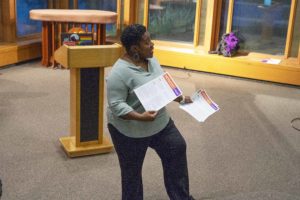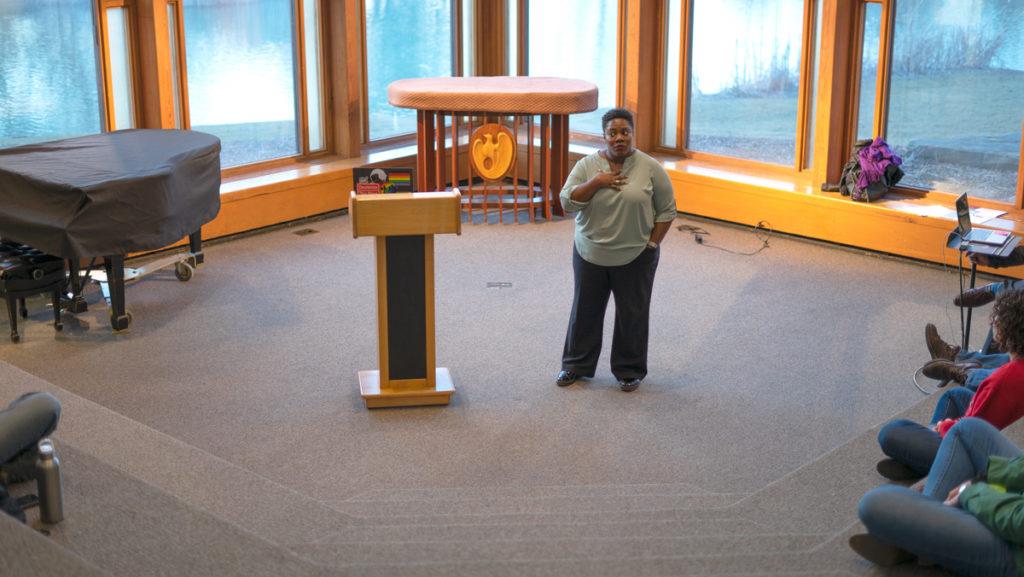An image of the Virgin Mary as an undocumented, Latina teenager may conjure up confusion — and even vehement rejection — from conservative religious followers. Recognizing and accepting LGBTQ identities seems counter to what many people view as traditional religious doctrine. But does acknowledging the fallibility of certain mainstream religious teachings constitute blasphemy? Heresy? Rev. Naomi Washington-Leapheart says no.
Washington-Leapheart held two discussions March 26 at Ithaca College about the intersections of faith, politics and identity. The first discussion, “Sacred Intersections: Where Spirituality and LGBTQ Liberation Meet,” took place in the Center for Natural Sciences Room 112 and interrogated the concept that the sacred and the political do not have to be mutually exclusive. The second talk, which occurred in Muller Chapel, was titled “Offensive Faith: Queering the Playbook for Religious Engagement” and outlined the possibility of advocacy work for LGBTQ folks within religious communities.
Washington-Leapheart is a multidenominational reverend — and also a queer black woman. She is the faith work director of the National LGBTQ Task Force, the oldest LGBTQ support and activism organization in the country. The goal of the Task Force is to work for the full freedom and civil rights of LGBTQ people.Washington-Leapheart said that achieving civil rights for the queer community begins with engaging in discussions about how religion approaches sexuality and gender identity.
“Much of the argument against the political liberation of LGBTQ people is rooted in a particular religious understanding that LGBTQ people are despised by God, that LGBTQ people are non-normative and therefore not deserving of the kind of civil rights that everybody else enjoys,” Washington-Leapheart said.

Hierald Osorto, the director of religious and spiritual life at the college, said the idea to bring speakers like Washington-Leapheart to the college came out of conversations held in Fall 2018. That same semester, news of LGBTQ intolerance in the Ithaca College Protestant community came out. He said the Office of Religious and Spiritual Life wanted to engage the campus community in talks about sexuality, spirituality and activism.
“It fits the mission and vision of our office,” Osorto said. “We want to create spaces where, as a community, we’re able to live integrated lives. So for us, it’s important that we provide models of what that looks like on a campus where religion has, for a while now, been seen as something that rejects — as something that divides. There have been very few instances where there have been opportunities for this community to see reflections of religion and spirituality that reflect wholeness, that reflect well–being and that reflect an ability for people to be fully who they are.”
In light of the recent experiences students had with instances of homophobia in the ICPC and the subsequent resignation of Protestant chaplain, Rev. James Touchton, as well as the recent allegations of sex with a minor against since-resigned Catholic chaplain Rev. Carsten Martensen, some of the campus community has felt alienated from — if not resentful toward — faith communities at the college.
Sophomore Mayuri Perera attended both of Washington-Leapheart’s talks. He said that though he does not have specific religious affiliations, he was interested to see how these conversations might respond to recent conflicts in religious communities both on and off campus.
“I just thought that it would be interesting to see the connection between spirituality and religion and activism, especially given the campus climate and just the general global climate,” Perera said.
Perera said he witnessed many people on campus feel distant, and perhaps rejected from, religious communities because of the exclusive language and ideologies that have surfaced recently.
“It’s easy to internalize that, to carry that with you, so that even when you do pass through maybe neutral spaces like the chapel on campus, you have this red flag,” he said.
Washington-Leapheart said that before she became an activist for the queer community and a religious leader, she also felt a disconnect between her identity and her faith. She grew up in a religiously conservative community, was involved at her church and attended private Christian school from kindergarten to eighth grade. She said it was not until college that she met individuals who were both queer-identified and Christian and that she discovered her queer identity, too.
Because she was so involved in her church community, it took her some time to come out to it and to her family. She said the journey of accepting herself as both a queer person and a religious person led her to a sense of wholeness. She said she realized that she felt called to more than just small-scale volunteer work at her church. She attended seminary, became a reverend and served as a pastor. She engaged in activism locally but now works at a national level with the LGBTQ Task Force.
“It’s my belief that whatever faith tradition we’re drawn to should invite us into cohesion and integration,” Leapheart said. “It should invite us into living wholly and fully and not in pieces, because we can’t survive in pieces.”
The arguments of both of Washington-Leapheart’s talks focused on living in wholeness with spiritual beliefs, gender identity, sexuality and political action.
“I would say that any political position that cuts you off from your faith and cuts you off from your spirituality needs to be interrogated, and any religious practice that cuts you off from your sense of ethics and morality and politics should be interrogated as well,” she said.
Perera said he was surprised and interested by the intersection of these topics in Washington-Leapheart’s talks.
“It’s one thing to listen to an activist talk about how to make progress and explain different parts of society, but it’s a whole other experience to actually hear it from a faith leader,” he said. “It seems so radical.”
These liberal conversations can feel radical in religious spaces that formerly condemned or ignored them altogether. Washington-Leapheart said the title of her second talk, “Offensive Faith,” had two meanings: first, that the holiness of queerness and sexuality can be offensive to some in traditional religious ideologies, and second, that those with queer identities must be on the offensive and actively make space for themselves in faith communities. To those who grew up fearing fire and brimstone for accepting queerness and other non-normative identities and practices, these conversations can be difficult.
“That means I have to see the holy where I haven’t seen the holy before,” Washington-Leapheartt said. “I have to see the holy in the black mother who just wants her black child to live and not be killed. I have to admit that there’s a connection between Christianity and white supremacist violence and the Ku Klux Klan. … And that’s very disruptive to anybody, to everybody who has inherited a set of religious symbols, a set of religious practices that feel safe and that feel comfortable. … It threatens everything that I thought I knew about myself and that I thought I knew about God, and it forces me to see holiness where I haven’t seen it before.”

Seeing holiness in untraditional places is what Leapheart said inspires her personal faith and her work.
“I believe that human sexuality is a gift from God to be celebrated and affirmed,” she said. “I think, as in all things, the divine is interested in our ethical relationships. … Is this relationship born in and manifested in love and justice?”
Washington-Leapheart admits the Bible is fraught with exclusionary statements and even narrates rape, violence and genocide. But she said she does not believe divine revelation is confined to just the holy book. She said much of the mainstream religious society’s beliefs about homosexuality come from ancient verses translated from Greek and Roman languages that did not have an equivalent word for the concept. Leapheart said that knowing the history of the Bible has influenced her understanding of the divine and allowed her experiences with God to come from love and acceptance.
“My litmus test for reading the Bible is, ‘Is my interpretation of this text inviting me to be more loving or more compassionate, more generous, more kind, wiser, in a better relationship?’ If it’s not, then I’ve got to look at my interpretation of the text.”
Perera said he felt conversations like these showed that faith leaders at the college are working to be inclusive and engage in critical, challenging discussions.
“In small spaces, in small moments like these, these conversations are being held, and there are people trying to push it forward,” he said.
Osorto said he sees hope in the college’s religious communities’ room to grow.
“I’m excited for this work on this campus,” he said. “I think that there is a lot of hope that I see in the possibility of these conversations, and we’re just getting started. … We’re going to continue to try new ways to really represent our community, and we have amazing stories of spiritual histories and just how people enact their values in the world.”














